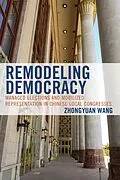This book explores why, how, and under what conditions a single-party regime uses formal democratic institutions to strengthen its rule. Zhongyuan Wang challenges the traditional perceptions that the Chinese congress acts either as mere window dressing or as an immediate catalyst for democratization. He argues that managed elections and mobilized representation are two strategic cards of China's one-party regime. By downplaying input electoral competition but promoting output congressional representation, the Chinese Communist Party has been committed to remodeling its unique brand of "socialist democracy" as an alternative to liberal democracy. Such a model of democracy with Chinese characteristics features the "Leninist trinity" of the Party's leadership, the rule of law, and people's sovereignty, as well as a new form of mobilized representation that relies heavily on non-electoral accountability from the top down. Remodeling democracy enables China's one-party regime to enhance its resilience and consolidate and sustain its rule.
Autorentext
Zhongyuan Wang is assistant professor at Fudan University and research fellow at the Fudan Institute for Advanced Study in Social Sciences (IAS-Fudan).
Inhalt
Chapter 1 Introduction and Overview
Chapter 2 Research Design and Methodologies
Chapter 3 Institutional Design and Development of Chinese Congress
Chapter 4 Playing by the Rules: How China's Party Regime Manufactures Certainties in Direct Congressional Elections
Chapter 5 Closing the Window of Opportunity The Party Regime's Adapted Strategies for Managing Independent Candidates
Chapter 6 Engineering RepresentationMobilized Representation in Chinese Local Congresses
Chapter 7 Conditions for Regime Consolidation by Elections
Chapter 8 Conclusion and Looking Forward
